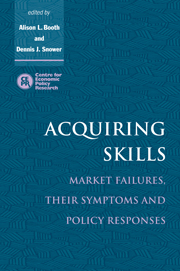Book contents
- Frontmatter
- Contents
- List of figures
- List of tables
- Preface
- List of contributors
- 1 Introduction: does the free market produce enough skills?
- Part I Market Failures: The Causes Of Skills Gaps
- Part II Empirical Consequences Of Skills Gaps
- 7 Changes in the relative demand for skills
- 8 Skill shortages, productivity growth and wage inflation
- 9 Workforce skills, product quality and economic performance
- 10 Workforce skills and export competitiveness
- Part III Government failures and policy issues
- Index
8 - Skill shortages, productivity growth and wage inflation
Published online by Cambridge University Press: 16 November 2009
- Frontmatter
- Contents
- List of figures
- List of tables
- Preface
- List of contributors
- 1 Introduction: does the free market produce enough skills?
- Part I Market Failures: The Causes Of Skills Gaps
- Part II Empirical Consequences Of Skills Gaps
- 7 Changes in the relative demand for skills
- 8 Skill shortages, productivity growth and wage inflation
- 9 Workforce skills, product quality and economic performance
- 10 Workforce skills and export competitiveness
- Part III Government failures and policy issues
- Index
Summary
This chapter argues that the supply of skills is widely believed to be a problem in the UK and other advanced market economies; thus firms experience significant skill shortages.
Evidence of skill shortages is obtained from two panel data sets of three-digit UK manufacturing industry. It is shown that skill shortages are higher on average and more variable over the business cycle in the UK than in comparable economies. Unskilled shortages are comparatively rare. The bulk of the evidence suggests that shortages are related to educational attainment rather than the failure of firms to adjust wages.
Skill shortages may have two effects on productivity. First, skill shortages add to the cost of employing skilled workers, since a firm must wait longer than usual to fill its vacancies. This leads firms to substitute unskilled for skilled labour, thereby reducing productivity. Secondly, skill shortages improve the skilled workers' outside options, making it more difficult for firms to induce them to work hard. Both these effects reduce productivity.
The chapter provides evidence showing that the growth of skill shortages in the UK over the 1980s reduced productivity growth by about 0.4% per year (average productivity growth was about 5%). This problem could also give rise to inflation, as excess demand for skilled workers improves the outside employment opportunities of skilled workers, enabling them to negotiate higher wages. Haskel and Martin find that although industry skill shortages have no effect on industry wages, wages do appear to be affected by aggregate skill shortages.
- Type
- Chapter
- Information
- Acquiring SkillsMarket Failures, their Symptoms and Policy Responses, pp. 147 - 174Publisher: Cambridge University PressPrint publication year: 1996
- 12
- Cited by



